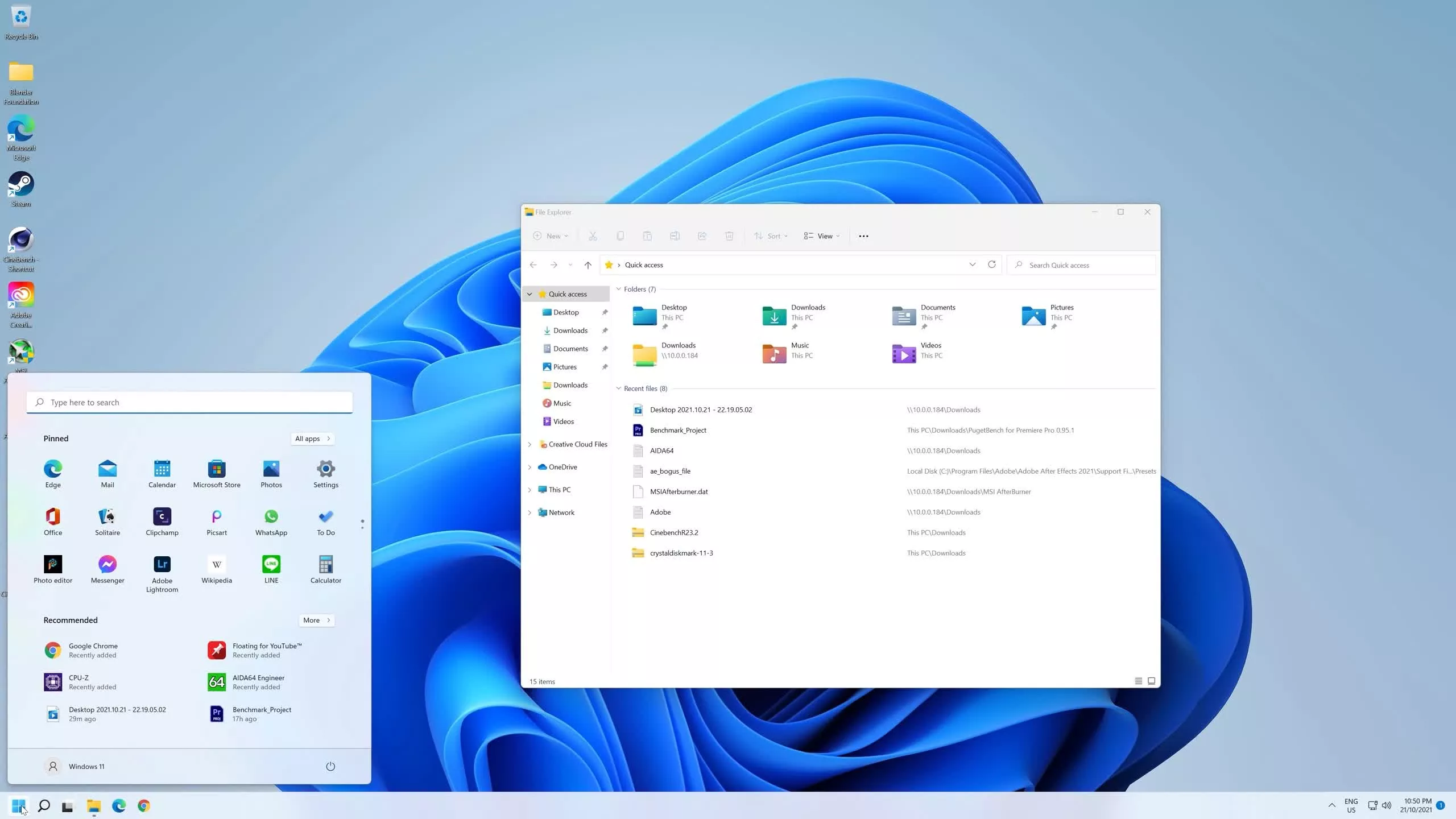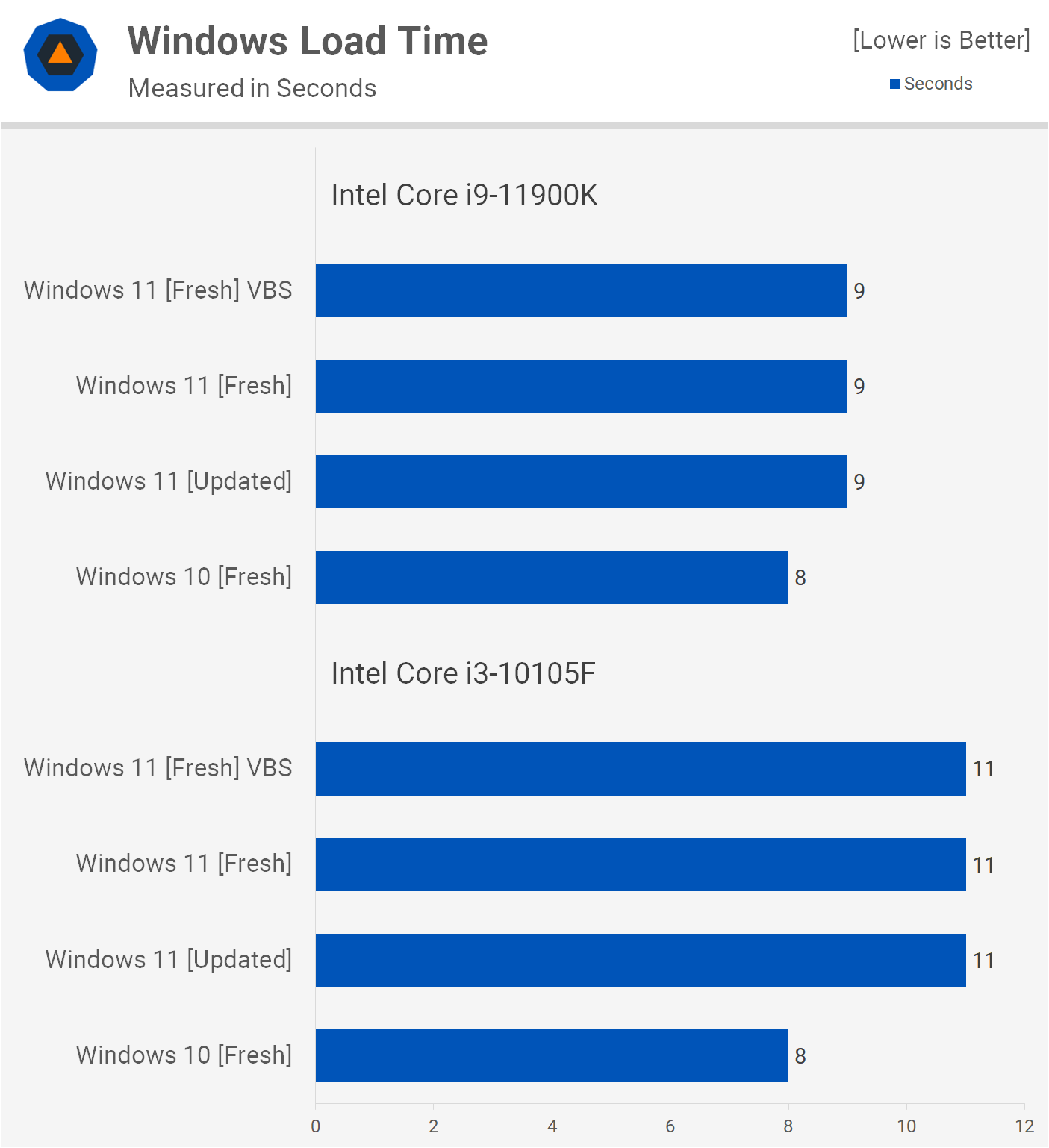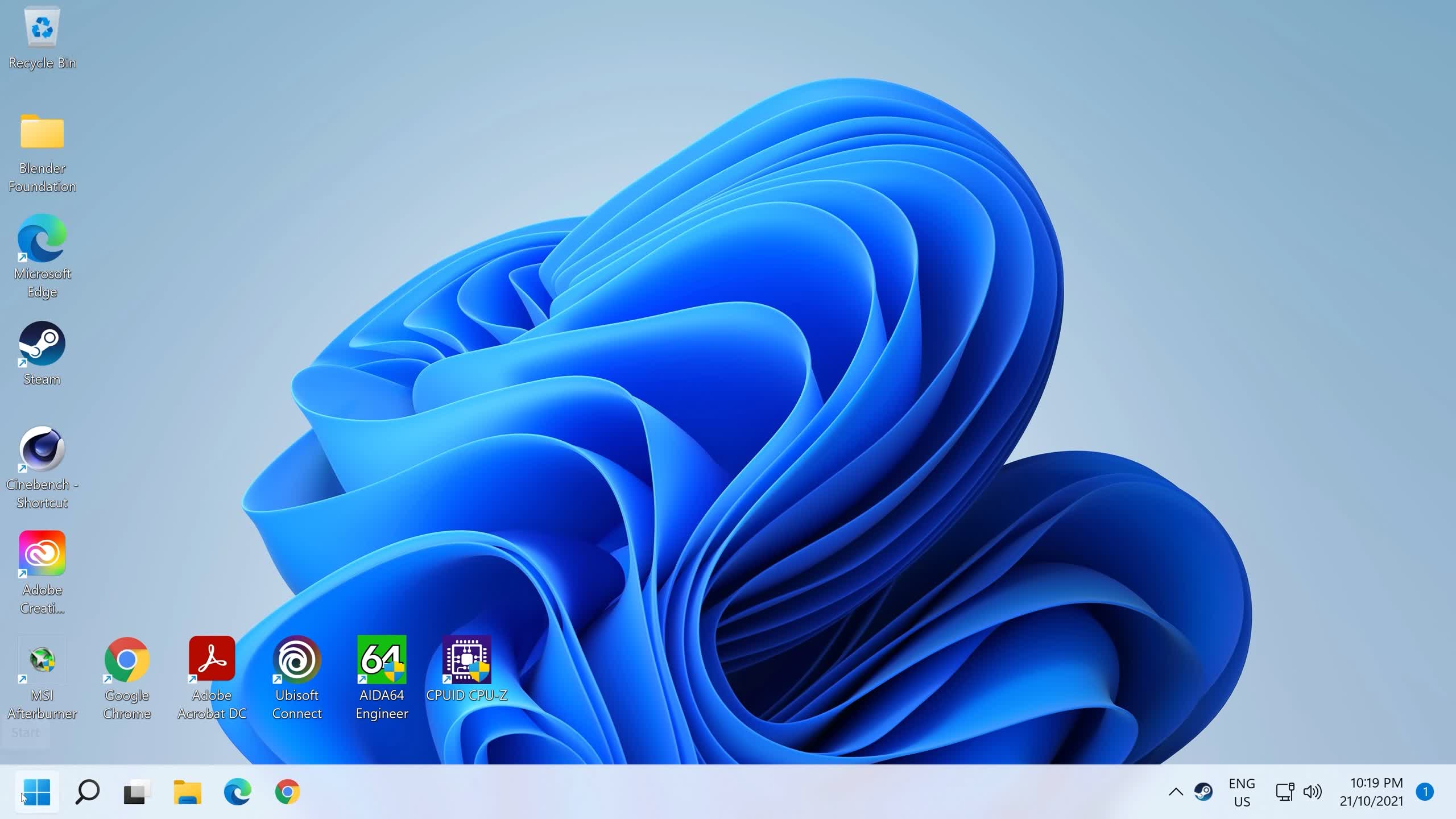Windows 10 vs. Windows 11 Performance Test
Today we're talking our outset real look at Windows xi operation with some Intel Cadre processors. There'south a few reasons why nosotros wanted to test using Intel's 10th and 11th gen CPUs first -- of form, to see how much difference there is when compared to Windows ten -- but also to plant some baseline data that we can come dorsum to in a few weeks with 12th-gen Alder Lake CPUs, which is meant to benefit from scheduling updates made with Windows 11.
As far every bit nosotros're aware, Intel 10th and 11th-gen desktop CPUs should deliver comparable performance using either Windows x or Windows 11. Simply as always there seems to exist alien reports, some claiming Windows 11 is much faster and others suggesting the contrary is true.

To discover out what is what, we've tested over half a dozen configurations using the flagship Intel Core i9-11900K alongside an entry-level Core i3-10105F, which is a refreshed 10th gen function, featuring 4 cores with 8 threads. The idea is to meet if there are whatever performance changes using either depression-cease or high-finish hardware.

Now along with a fresh install of Windows 10 and Windows 11, we've also included a configuration based on a Windows 10 fresh install that was then upgraded to Windows 11. We should annotation that by fresh install we mean this is a recent install of Windows made on a make new SSD, which is then loaded with all the applications we require for testing and diagnosing performance, so at that indicate nosotros've installed every bit many (or more) applications and games than most of you volition take installed at a given time.

TeamGroup was gracious plenty to send over a pair of their 8TB MP34Q M.2 NVMe SSDs. These tiny SSDs offer 8TB of loftier speed storage and nosotros've got 1 for the Windows 10 testing and another for Windows 11, which immune the states to go back and forth to double and in some instances triple check results.

The drives offer read throughput of up to 3.4 GB/s with writes as fast as 3 GB/s and we'll be including some storage test results towards the cease of the article.
A word about VBS
The fourth configuration we've included is i with Virtualization-Based Security (VBS) enabled. By default, our Windows eleven install disabled this feature, but it's been reported that on some desktop and laptop PCs, VBS is enabled by default and can tank gaming performance by up to 25%.
Information technology should exist noted that VBS isn't a new characteristic and information technology's certainly not exclusive to Windows 11. Yous can enable information technology on Windows 10, merely we've never come beyond a single configuration where it's enabled by default.
To check if VBS is enabled, employ Windows search, type 'MSInfo32' and hit Enter. Towards the lesser of the system info you'll notice if Virtualization-Based Security is enabled or non. To toggle it on/off, enter the Windows Security menu, navigate to the Device Security tab and under the header "Core isolation" you lot'll discover the ability to toggle disable VBS.

We don't feel this is a feature most desktop users will need or want to enable, and this is especially true for gamers. But nosotros've run a carve up configuration with it enabled merely then you tin see the performance bear on.
For those of you wondering, VBS is an enterprise-class feature designed to secure corporate PCs by creating an isolated and secure region of retention from the normal operating system. Windows tin use this 'virtual secure fashion' to host a number of security solutions, providing them with greatly increased protection from vulnerabilities in the OS, and preventing the utilize of malicious exploits which attempt to defeat protections.
Going into the benchmark stage, our test systems used the Core i9-11900K and Core i3-10105F, both of which were installed on the Asus ROG Strix Z590-E Gaming WiFi motherboard using BIOS version 1007. For the retentiveness, nosotros've gone with a Crucial Ballistix DDR4-3200 CL16 kit, and for the graphics card the MSI RTX 3090 Gaming X Trio.

As for the testing itself we're going to look at application, gaming, storage and load time operation. All results are based on a 3 run average and in some instances we powered downwards the entire system between runs to avoid cached results. Okay allow'southward get into the results.
Cache and Memory Latency Performance
Before we jump into the application benchmarks hither's a quick look at cache and retentivity latency operation. In short we see no alter, or virtually no change in L1, L2 or L3 cache functioning with the Intel processors. Where we do meet a notable performance divergence is when looking at DRAM latency...




For the 10105F, the Windows x and Windows 11 installs deliver the same results, only enabling VBS does incur a 7% performance punishment and this will be noticed in memory-sensitive scenarios, such every bit gaming.
With the more powerful 11900K, we see that Windows 10 delivered the best results as the upgrade to Windows xi increased latency past 5%, though a fresh Windows 11 install just increased latency by 3%. Yet, we're over again seeing a noteworthy increase with VBS enabled, this time a 9% increase is seen when compared to the Windows 10 configuration.
Awarding Benchmarks
Moving on to Cinebench R23, we find that the 11900K produced its best result with Windows 10 though the difference is minimal, about a 1% increment over the fresh Windows 11 install. Enabling VBS had a very minor impact on functioning at 2%, with the variation between the slowest and fastest configurations, and the same is too true for the Cadre i3 arrangement.


The Blender Open Data is very similar to what was seen with Cinebench. The Windows 10 and Windows xi results are essentially identical, but enabling VBS comes with a slight operation penalisation, this fourth dimension around three% when compared to what we saw when using Windows x.

Moving on to the 7-Zip File Manager results nosotros see that for the most part the Core i3 processor is able to evangelize the same level of performance using Windows ten or 11, with the VBS enabled Windows xi configuration being the simply exception every bit functioning dropped 3%.
The margins were slightly larger with the 11900K and we found that Windows 10 provided the best results. Upgrading the Windows 10 install to Windows 11 reduced performance by three% and a fresh install restored some of that. Then when comparing the fresh Windows 11 install with VBS enabled we again saw a 3% performance hit.

Testing with Adobe Photoshop 2022 shows like performance for all four tested configurations when using the Cadre i3 processor and enabling VBS resulted in a 3% performance hit.
That said, we saw a far more significant 7% performance drop with the 11900K when using VBS. Nevertheless, when comparing the fresh Windows 10 and xi installs performance was much the same.

Both the Cadre i3 and Cadre i9 parts delivered the same functioning using either Windows 10 or eleven in the Adobe After Effects benchmark, though this time we run into a meaning x% performance drop with VBS enabled.

The last application criterion is based on Adobe Premiere Pro and we're looking at virtually identical performance using Windows ten or eleven. The only exception is the VBS enabled config equally this reduces functioning by 12-xiii%.
Gaming Benchmarks
Time for a few game benchmarks. Please note we're not testing dozens upon dozens of games, rather y'all go the idea with merely a few, and so nosotros're going to evidence the results for 4 titles, starting with F1 2022.

Using the Core i9-11900K we see that the fresh installs of Windows 10 and 11 delivered the aforementioned performance. Updating the Windows ten install to xi wasn't as fast, just we're talking extremely small margins of departure hither.
Those margins were slightly increased with the Core i3 part, and Windows x did offer the best outcome past just three%.

Rainbow Six Siege results are interesting equally VBS reduced frame rates by 11-12%, though that margin is probable exaggerated due to the extremely high frame rates. Those results aside we come across identical operation from Windows 10 and Windows 11 using either CPU.

Enabling VBS reduced performance in Watch Dogs: Legion past up to 8%, seen when looking at the i% low figures. That bated, the fresh Windows 10 and 11 installs delivered the same results while there was a very pocket-size performance hit when only upgrading 10 to 11.

The concluding game nosotros tested was Cyberpunk 2077 and here we're looking at a ~8% performance hit with VBS installed. Other than that, performance is the same when comparison Windows 10 and eleven.

Here's a look at Cyberpunk 2077 level load times using the TeamGroup 8TB NVMe SSD and here we're looking at no more a 1 2d difference between the various configurations, then Windows 11 won't speed upwards load times of today's games.

Interestingly, Windows 11 was also slower to load when compared to Windows ten, though the margin when running the 11900K is insignificant. Where the difference was somewhat more pregnant was with the Cadre i3 processor as Windows xi took well-nigh 40% longer to load, though that'south a mere 3 second alter. Notwithstanding for our configuration Windows 11 didn't improve boot times.
Storage Performance
Before wrapping upwardly testing, here's a look at storage performance with CrystalDiskMark. Read and write sequential functioning is the same regardless of the configuration, so nothing to report hither. All the same, the random queue depth 32 results are interesting.
Windows xi is offering a massive increase in write performance over Windows 10. To exist entirely honest, I'chiliad no longer familiar with SSD testing and I haven't run CrystalDiskMark in years, but I can tell you lot afterward multiple organization resets the results were repeatable and I did completely fill the make new SSD earlier I began testing.


And so I believe the 20-26% performance increase nosotros're seeing here with the 11900K is authentic, I'one thousand just non sure why we're seeing such a substantial performance improvement. There was even a 10% uplift from Windows x to 11 with the Core i3 processor despite the results being much lower overall.
Another interesting point to annotation is that VBS cripples storage throughput, lowering both read and write performance. With the 11900K nosotros're looking at a 21% driblet for read throughput and a massive 58% drop in write throughput, or some other way of putting it, Windows 11's random write performance was virtually 2.5x faster with VBS disabled.
What We Learned
In that location you have information technology. For the well-nigh office there is little to no divergence between Windows 11 and Windows x using Intel 10th and 11th-gen Core serial processors across gaming, application, and storage operation. If y'all've experienced a notable drop in operation since upgrading, information technology's well worth checking to run into if VBS is enabled and do something about that as we explained in the intro.
Information technology'due south also worth noting that for maximum performance yous're meliorate off starting over with a fresh install of Windows 11. Besides the small functioning loss that was seen with the upgraded install, we too on occasion randomly suffered blue screen crashes when loading Windows 11, something that never happened with the fresh install.

Every bit ever, the upgrade process is more convenient and we have systems that are running fine this manner, but if you're suffering from stability issues after upgrading, in that location's a adept hazard that process is the source of your troubles.
In a nutshell, Windows eleven offers no existent performance advantage over Windows 10 with maybe the only exception being random read/write storage performance, but we won't know if this was express to our test configuration or not until we conduct farther testing. On that notation, we're smashing to see what Windows eleven does for Intel's upcoming Alder Lake CPUs, likewise as a wait at Ryzen which recently received a patch that addresses L3 enshroud operation issues.

On that notation, we'll be primarily testing Alder Lake using Windows 11 for our day-ane review while sticking with the Windows 10 data we have for all older platforms, including Ryzen. We've just found that won't place the 10th and 11th-gen Core series processors at a disadvantage, and so with that nosotros're going to wrap this i upward and move on to testing some upcoming Intel CPUs for an upcoming review very presently.
Source: https://www.techspot.com/article/2349-windows-11-performance/
Posted by: carrfromeannown.blogspot.com


0 Response to "Windows 10 vs. Windows 11 Performance Test"
Post a Comment